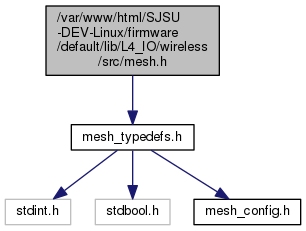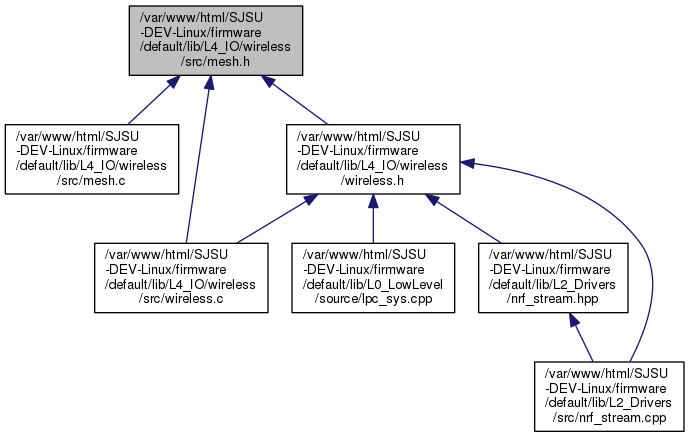Simple Mesh Network Algorithm.VERSION: More...
#include "mesh_typedefs.h"

Go to the source code of this file.
Functions | |
| bool | mesh_init (const uint8_t local_node_id, const bool is_mesh_node, const char *node_name, const mesh_driver_t driver, const bool discovery) |
| bool | mesh_set_node_address (const uint8_t local_node_id) |
| uint8_t | mesh_get_node_address (void) |
| void | mesh_set_retry_count (const uint8_t count) |
| void | mesh_service (void) |
| bool | mesh_send (const uint8_t dst, const mesh_protocol_t type, const void *pData, const uint8_t len, const uint8_t hop_count_max) |
| bool | mesh_form_pkt (mesh_packet_t *pkt, const uint8_t dst, const mesh_protocol_t type, const uint8_t hop_count_max, uint8_t num_ptrs,...) |
| bool | mesh_send_formed_pkt (mesh_packet_t *pkt) |
| bool | mesh_deform_pkt (mesh_packet_t *pkt, uint8_t num_ptrs,...) |
| const mesh_rte_table_t * | mesh_get_routing_entry (const uint8_t route_num) |
| uint8_t | mesh_get_num_routing_entries (void) |
| bool | mesh_is_route_known (const uint8_t addr) |
| uint8_t | mesh_get_pnd_pkt_count (void) |
| uint32_t | mesh_get_expected_ack_time (uint8_t node_addr) |
| uint32_t | mesh_get_max_timeout_before_packet_fails (uint8_t node_addr) |
| mesh_stats_t | mesh_get_stats (void) |
| mesh_error_mask_t | mesh_get_error_mask (void) |
| void | mesh_reset_error_mask (void) |
| Resets the error mask to zero. More... | |
Detailed Description
Simple Mesh Network Algorithm.
VERSION:
- See also
- mesh_config.h version and change history information.
- Simple Mesh Algorithm for low powered radios.
- This library has small footprint with minimal code and RAM requirements. Each node can be a repeater node, and contains its own routing table.
- Types of Packets
- NACK : "Fire-and-Forget" packet, no acknowledgment from receiver.
- ACK : Receiver will auto-acknowledge, and packet is retransmitted if ACK not received.
- Broadcast, and Application ACK
- Example Initialization Code:
- Assuming the radio functions and application receive function is provided, init() code is simple :
- Sample code for a node receiving data :
- // Global variablesmesh_packet_t packet;bool rx = false;// Application receive callbackint my_app_recv(void *data, int len){memcpy(&packet, data, len);rx = true;}// main loop :while(1) {mesh_service();if(rx) {rx = false;if(mesh_is_ack_required(&packet)) {mesh_send_ack("Hello Back", 10, &packet);}}}
- Warning
- Care needs to be taken for single radio systems when they send out a packet. You don't want the mesh route discovery packet to be repeated at the same time by the nearby nodes because their data will collide and nothing will go through. The radio send function can then be modified with logic similar to : char my_radio_send(char* pData, int len){if (mesh_get_node_address() != pkt->nwk.src) {if (MESH_ZERO_ADDR == pkt->mac.dst) {const uint32_t timeSlotDelayUs = ((rand() % slots) + 1) * pkt_air_time_us;delay_us(timeSlotDelayUs);}}}
Function Documentation
| bool mesh_deform_pkt | ( | mesh_packet_t * | pkt, |
| uint8_t | num_ptrs, | ||
| ... | |||
| ) |
This does the opposite of mesh_form_pkt(). Instead of copying data from the pointers and storing to the packet data, this will copy the data from the packet and store to your pointers.
- Parameters
-
pkt The mesh packet received. num_ptrs The number of pairs of pointers.
- Returns
- false if the packet was smaller than the data being asked to store.
| bool mesh_form_pkt | ( | mesh_packet_t * | pkt, |
| const uint8_t | dst, | ||
| const mesh_protocol_t | type, | ||
| const uint8_t | hop_count_max, | ||
| uint8_t | num_ptrs, | ||
| ... | |||
| ) |
Form a packet by copying the data from the given pointers as variable arguments.
- See also
- parameters of mesh_send()
- Parameters
-
num_ptrs The number of data pointer pairs; see below. ... The pairs of data pointer and the size; see below.
- Returns
- true if packet was formed correctly. Error may be returned if you tried to send too much data that the payload cannot hold.
- Warning
- Once a packet is formed, it should be immediately sent because packet route may change later, so the packet may not make it through.
| mesh_error_mask_t mesh_get_error_mask | ( | void | ) |
Mesh API to get error types and reset errors Mesh layer keeps error bit fields during its operation. The error mask can be obtained and masked with mesh_error_mask_t to detect the error type, and it can be reset by this API.
- Returns
- errors encountered during mesh network operation.
| uint32_t mesh_get_expected_ack_time | ( | uint8_t | node_addr | ) |
- Returns
- the expected number of milliseconds it should take for the destination node to send us an ACK packet. This is the most ideal time assuming no packet is lost while sending or receiving the ACK. If the route is not known, then the timeout returned is based on the assumption that it is MESH_RTE_DISCOVERY_HOPS (#define'd) hops away.
| uint32_t mesh_get_max_timeout_before_packet_fails | ( | uint8_t | node_addr | ) |
- Returns
- similar to mesh_get_expected_ack_time(), but the returned value is the max expected timeout after we exhaust our retries.
| uint8_t mesh_get_node_address | ( | void | ) |
- Returns
- our mesh node address.
| uint8_t mesh_get_num_routing_entries | ( | void | ) |
- Returns
- The number of routing entries this node is maintaining.
| uint8_t mesh_get_pnd_pkt_count | ( | void | ) |
If there are is no packet received from your radio, and there are not any pending packets, then mesh_service() doesn't have to be called periodically.
- Returns
- The number of packets that are in the pending state, means they are waiting to be acknowledged, or repeated after a timeout.
| const mesh_rte_table_t* mesh_get_routing_entry | ( | const uint8_t | route_num | ) |
Allows user to query all the routing entries.
- Parameters
-
route_num The route number to query : 0 - (N-1) When NULL is returned, no more route exists. If Non-NULL entry is returned, user can look at destination, the route to next destination, and number of hops it is away.
| mesh_stats_t mesh_get_stats | ( | void | ) |
- Returns
- The mesh network statistics structure.
| bool mesh_init | ( | const uint8_t | local_node_id, |
| const bool | is_mesh_node, | ||
| const char * | node_name, | ||
| const mesh_driver_t | driver, | ||
| const bool | discovery | ||
| ) |
Initializes the Mesh Network.
- Parameters
-
local_node_id Node ID of your local node. is_mesh_node true, if this node can participate in Mesh to repeat packets. node_name Node name, maximum as large as a payload. driver The structure of the radio driver. discovery If true, then a broadcast message with data: "Hello\n" is sent to each node within 3 hops away for discovery and route update purpose.
- Note
- Unless changed otherwise, the retry count contains default value;
- See also
- mesh_set_retry_count()
| bool mesh_is_route_known | ( | const uint8_t | addr | ) |
- Returns
- true if our routing table contains the route for the given destination address.
| void mesh_reset_error_mask | ( | void | ) |
Resets the error mask to zero.
| bool mesh_send | ( | const uint8_t | dst, |
| const mesh_protocol_t | type, | ||
| const void * | pData, | ||
| const uint8_t | len, | ||
| const uint8_t | hop_count_max | ||
| ) |
Sends a new packet.
- Parameters
-
dst The destination address to send data to. type The type of packet: ack, nack, app-ack
- See also
- mesh_protocol_t
- Parameters
-
pData The pointer to the data to send. len The length of the data to send. hop_count_max See the 3 use cases below : - If this is a broadcast message, this controls the max hops packet can take.
- If the route is known, then this parameter will not have any effect.
- If the route is unknown, then this controls how far the packet can travel to search for our destined node. You can pass MESH_HOP_COUNT_MAX if you want the mesh algorithm to figure it out at the cost of utilizing the network a little more and decreasing its efficiency.
- Returns
- true if the packet was sent successfully
- Warning
- This function SHOULD NOT be used to send an ACK back because infinite loop of back-and-forth ACKs may occur.
- See also
- mesh_send_ack()
- Note
- This method and mesh_service() can be called from different threads because mesh_service() will skip its execution if we are inside a critical section.
| bool mesh_send_formed_pkt | ( | mesh_packet_t * | pkt | ) |
Send a packet that is already formed.
- Parameters
-
pkt The packet pointer formed by mesh_form_pkt().
| void mesh_service | ( | void | ) |
This method should be called periodically. This method gets the radio data, and runs the mesh algorithm. When a packet is received for you, the app_recv() call-back will be called.
- Note
- When N1 sends a packet to 4 nodes it can transmit to, all four nodes will repeat the packet if the route is unknown, so we need these nodes to discard the packets they repeat to each other. However, when the origin node doesn't get an ACK back, it will r-esend the packet with the retries_rem decremented, such that all these nodes can repeat the packet instead of throwing it away. The destined node needs to only send data to application layer if packet is not a duplicate, however, for every re-sent packet, it needs to ACK back the packet.
| bool mesh_set_node_address | ( | const uint8_t | local_node_id | ) |
This method allows to change the node address after mesh_init() has been called.
- Parameters
-
local_node_id Node ID of your local node.
| void mesh_set_retry_count | ( | const uint8_t | count | ) |
- Parameters
-
count Number of retries used for ACK packet if ACK not received; see note below. Max value is MESH_RETRY_COUNT_MAX. Optimal value is 2 (default unless changed).
- Note
- The retries apply if routes do not change but the actual retry count may be higher if nodes change routes frequency. For example, if retries are set to 2, and a node N1 sends packet to N3 through N2, then the packet may be sent 6 times:
- Send original packet, if no ACK, then re-send 2 more times.
- Remove N3 route through N2 and re-send original packet to discover new route.
- Re-send packet 2 more times if ACK still not received.


 1.8.11
1.8.11